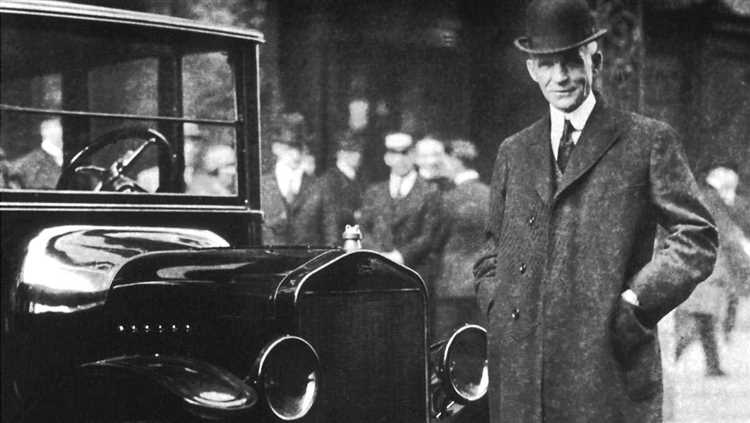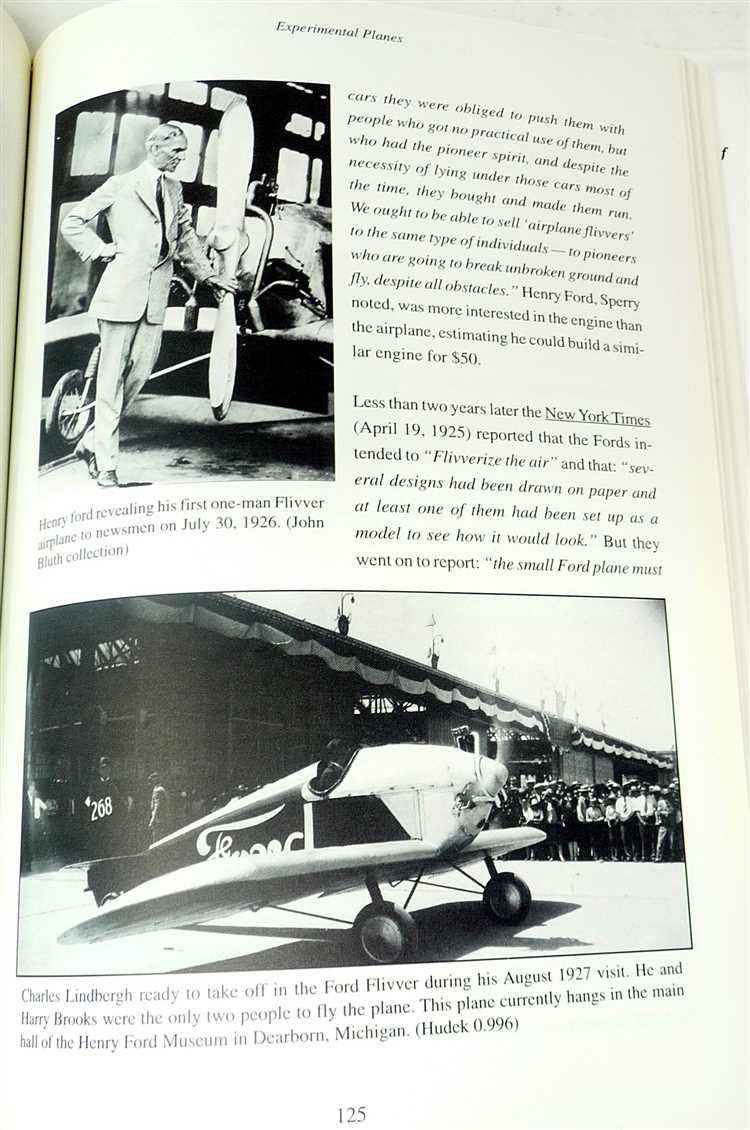
Henry Ford is a name that is synonymous with American innovation and entrepreneurship. As the founder of the Ford Motor Company, he revolutionized the automotive industry and forever changed the way people travel. But Ford’s impact goes far beyond just cars. His legacy extends to the realms of manufacturing, labor practices, and even social change.
One of Ford’s most lasting contributions was his development of the assembly line. By implementing this innovative production method, Ford was able to dramatically increase efficiency and reduce costs. This not only allowed him to produce cars at a faster rate, but also made them more affordable for the average American. The assembly line became a model for other industries and remains a fundamental concept in modern manufacturing.
However, Ford’s influence was not limited to manufacturing techniques. He also revolutionized the way companies treated their employees. In an era of harsh working conditions and long hours, Ford implemented the groundbreaking concept of the 8-hour workday and a minimum wage. These changes not only improved the lives of his workers, but set a precedent for fair labor practices that still exist today. Ford understood that happy and well-compensated employees would be more productive, a concept that is now widely accepted.
In addition to his contributions to industry and labor, Ford also played a significant role in social change. He believed in the power of education and was a strong advocate for literacy. In 1914, he established the Ford English School to help his immigrant workers learn English and assimilate into American society. Ford recognized that education was the key to success and empowerment, and his efforts to promote literacy had a profound impact on countless individuals.
“Whether you think you can, or you think you can’t – you’re right.” – Henry Ford
Henry Ford’s legacy is not just about cars, but about the transformative power of one person’s vision and determination. His innovations in manufacturing, labor practices, and social change continue to shape our world today. Ford’s impact can be seen in every aspect of American society, from the way we work to the way we travel. His legacy serves as a reminder that with the right mindset and a commitment to progress, one person can change the world.
The Early Life and Entrepreneurial Spirit of Henry Ford

Henry Ford, born on July 30, 1863, in Greenfield Township, Michigan, was the son of William and Mary Ford. Growing up on a farm, Ford developed a strong interest in mechanics and machines from a young age. He would often spend his spare time tinkering with various mechanical devices and learning about their inner workings.
At the age of 16, Ford left his family’s farm to pursue his passion for mechanics in Detroit. He began working as an apprentice machinist, gaining valuable hands-on experience and expanding his knowledge in the field. During this time, Ford also attended night school to further his education and improve his skills.
As Ford continued to develop his mechanical skills, he became increasingly interested in the emerging automotive industry. In 1896, he built his first self-propelled vehicle, which he called the “Quadricycle.” This four-wheeled vehicle was powered by a gasoline engine and had a top speed of around 20 miles per hour.
Ford’s entrepreneurial spirit and innovative thinking were evident throughout his early career. In 1903, he founded the Ford Motor Company, with the goal of making automobiles affordable and accessible to the average person. This vision led to the development of the Model T, which revolutionized the automotive industry and made Ford a household name.
Throughout his life, Ford continued to innovate and push the boundaries of what was possible in the automotive industry. His assembly line production system, introduced in 1913, revolutionized manufacturing and made the production of automobiles faster and more efficient. Ford’s dedication to innovation and his unwavering entrepreneurial spirit left a lasting impact on the world of business and transportation.
From a Farmer’s Son to an Innovator
Henry Ford, the founder of the Ford Motor Company, was born on July 30, 1863, in a small farming community in Michigan. As the son of a farmer, Ford learned the value of hard work and perseverance from an early age. Despite his humble beginnings, Ford possessed a curiosity and drive that would propel him to become one of the most influential innovators of the 20th century.
From an early age, Ford displayed a keen interest in mechanics and engineering. He was fascinated by the machinery used on his family’s farm and would often spend hours tinkering with tools and machines. This passion led him to leave the farm at the age of 16 and pursue a career as a machinist in nearby Detroit.
In Detroit, Ford quickly made a name for himself as a skilled engineer and inventor. He worked for several companies, honing his skills and gaining valuable experience along the way. However, it was his work on the assembly line that would ultimately revolutionize the manufacturing industry.
Ford’s introduction of the moving assembly line in 1913 allowed for the mass production of automobiles at a much lower cost. This innovation not only made cars more affordable for the average consumer but also drastically reduced production time. By streamlining the manufacturing process, Ford was able to produce vehicles at an unprecedented rate, forever changing the way products were made.
Beyond his contributions to the automotive industry, Ford also had a profound impact on society as a whole. He believed in paying his workers a fair wage and implemented the concept of the “five-dollar day,” which doubled the average factory worker’s wages. This not only improved the standard of living for his employees but also created a loyal workforce that was dedicated to the success of the company.
In conclusion, Henry Ford’s journey from a farmer’s son to an innovator is a testament to the power of determination and ingenuity. His ability to identify and solve problems revolutionized the manufacturing industry and had a lasting impact on society. Ford’s legacy continues to inspire future generations of inventors and entrepreneurs to push the boundaries of what is possible.
Revolutionizing the Automobile Industry with the Model T
The introduction of the Model T by Henry Ford in 1908 revolutionized the automobile industry and had a profound impact on society as a whole. The Model T was the first affordable, mass-produced car that was accessible to the average person. It was a game-changer, making car ownership a reality for the middle class and transforming the way people lived and traveled.
One of the key factors that made the Model T so revolutionary was its innovative production methods. Ford implemented the assembly line technique, which allowed for the efficient and rapid production of cars. This technique significantly reduced the cost of manufacturing, making the Model T much more affordable than other cars on the market at that time.
Another groundbreaking feature of the Model T was its use of interchangeable parts. This meant that each component of the car was standardized and could be easily replaced if it malfunctioned. This not only made repairs more accessible and affordable but also made it easier for Ford to mass-produce the Model T. The use of interchangeable parts also paved the way for the development of other industries, such as the aftermarket parts industry.
Furthermore, the Model T was designed to be practical and versatile, catering to the needs of a wide range of consumers. It was a reliable and sturdy vehicle that could navigate various terrains, making it suitable for both urban and rural environments. This versatility made the Model T a popular choice among farmers, businessmen, and families alike.
In conclusion, Henry Ford’s Model T revolutionized the automobile industry by introducing affordable car ownership to the masses. Its innovative production methods, use of interchangeable parts, and practical design were all instrumental in making the Model T a game-changer. The impact of the Model T extended beyond the automobile industry, shaping the way people lived, traveled, and worked.
Implementing the Assembly Line and Changing Manufacturing Forever
The implementation of the assembly line by Henry Ford revolutionized manufacturing and had a lasting impact on the industry. Before Ford’s innovation, cars were typically hand-built, which was a slow and expensive process. Ford’s idea was to break down the production process into smaller, more manageable tasks, allowing for greater efficiency and productivity.
By implementing the assembly line, Ford was able to drastically reduce the time it took to build a car. Each worker on the assembly line was responsible for a specific task, such as attaching a specific part or tightening bolts. This specialization allowed workers to become highly skilled in their specific task, increasing both speed and accuracy.
The assembly line also allowed for a continuous flow of production, as each car moved down the line at a constant pace. This eliminated the need for workers to move around the factory to complete different tasks, saving both time and effort. It also allowed Ford to produce cars in large quantities, making them more affordable and accessible to the average consumer.
The impact of Ford’s assembly line on manufacturing extended far beyond the automotive industry. Other industries quickly adopted the assembly line model, leading to greater efficiency and productivity across the board. This new method of manufacturing not only increased the speed of production but also reduced costs, making products more affordable for consumers.
Overall, Henry Ford’s implementation of the assembly line changed the manufacturing landscape forever. His innovative approach to production revolutionized the industry and set a new standard for efficiency and productivity. Today, the assembly line remains a fundamental concept in manufacturing, and Ford’s legacy continues to be felt in the way products are made and delivered to consumers.
The Social Impact and Philanthropy of Henry Ford
Henry Ford, the legendary American industrialist and founder of the Ford Motor Company, had a profound social impact and demonstrated a strong commitment to philanthropy throughout his life. Through his innovative business practices and revolutionary automobile production methods, Ford transformed the American manufacturing industry and revolutionized transportation.
One of Ford’s major contributions to society was his commitment to making automobiles affordable for the average working person. His introduction of the Model T, the first affordable car, revolutionized transportation and provided a new level of mobility for millions of Americans. This breakthrough allowed people to travel more easily, expanding opportunities for work, leisure, and education.
Additionally, Ford’s commitment to his employees’ welfare was groundbreaking for its time. He implemented the $5 a day wage for his workers, which was double the industry standard at the time. This decision not only improved the quality of life for his employees but also set a precedent for fair wages and better working conditions in the manufacturing industry.
Ford’s philanthropic efforts extended beyond his employees. He established the Ford Foundation in 1936, which aimed to promote human welfare and advance social change. The foundation has since become one of the largest and most influential philanthropic organizations in the world, providing funding and support for various initiatives in education, healthcare, and social justice.
In addition to the Ford Foundation, Ford also contributed to various charitable causes throughout his life, including education, healthcare, and community development. His contributions helped establish schools, hospitals, and libraries, providing resources and opportunities for countless individuals and communities.
In conclusion, Henry Ford’s social impact and philanthropy were significant and far-reaching. His innovative business practices and commitment to making automobiles affordable transformed transportation and improved mobility for millions of people. Additionally, his commitment to his employees’ welfare and his establishment of the Ford Foundation and other charitable initiatives have had a lasting impact on society, promoting social change and improving the lives of countless individuals and communities.